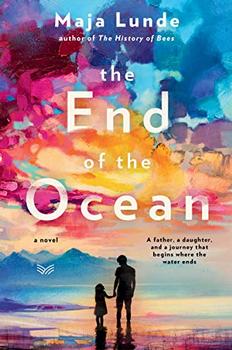Summary | Excerpt | Reviews | Beyond the Book | Readalikes | Genres & Themes | Author Bio

Chapter One
Signe
Ringfjorden, Sogn og Fjordane, Norway, 2017
Nothing stopped the water. You could follow it from the mountain to the fjord, from the snow that fell from the clouds and settled on the peaks to the mist that rose above the ocean and again became clouds.
The glacier grew every single winter. And every summer it melted, releasing drops, drops that became streams, which found their way down, driven by gravity, and the streams accumulated, becoming waterfalls, rivers.
We were two villages that shared a mountain and a glacier. We had them for as long as we could remember. One side of the mountain was a vertical wall, where the Sister Falls descended. They crashed straight down for 711 meters toward Lake Eide, a deep green body of water after which the village was named, Eidesdalen, and which provided fertile growing conditions there for animals and human beings.
Eidesdalen, Magnus's village.
They couldn't see the fjord in Eidesdalen; they weren't accustomed to having the taste of salt on their lips. The salt was not carried by the wind and they could not smell the ocean. But they had their water, the water without taste, the water that made everything grow—and later Magnus said that he had never missed the ocean.
On the other side of the mountain it was milder, less harsh. Here the water accumulated in the River Breio, the salmon's river, the water ouzels' river, the freshwater mussels' river. It forced its way through a crevasse in the landscape, forming this chasm with millions of drops every second, in waterfalls, in streams, and in calm, smooth stretches. When the sun shone, it became a luminous ribbon.
The River Breio continued all the way to Ringfjorden, and there, in the village at sea level, the river met with salt water. There the water from the glacier became one with the ocean.
Ringfjorden, my village.
And then they were together, the water from the glacier and the water from the ocean, until the sun absorbed the drops once more, drew them up into the air as mist, to the clouds, where they escaped the force of gravity.
I'm back now. Blåfonna, the glacier that once was ours, has forced me to return. There is no wind when I reach Ringfjorden. I am obliged to use the engine to travel the final stretch, and the clattering sound drowns out everything else. Blue glides through the water and leaves only small ripples in its wake.
I can never forget this landscape. "It has created you, Signe," Magnus once said. He meant it had imprinted itself in me, the way I walk with my legs slightly bent, as if I were always confronting a hill. Nonetheless I am surprised now when I see it again: the summits, the falls, the vertical meeting the horizontal.
People travel here from far away to see this landscape and find the sight to be "beautiful, fantastic, amazing." They stand on ship decks as large as football fields while enormous diesel engines spew out exhaust fumes. They stand there and point and gaze at the clear blue water, the bluish-green hillsides where fragile houses cling tightly to forty-five-degree-angle slopes. More than one thousand meters above them are the mountains, the earth's stripped, sharp edges, breaking against the sky, with a sprinkling of white that the tourists love. "Wow, it's snow," they say, whether it's winter or summer.
But the tourists don't see the Sister Falls or Sønstebø's summer farm on the mountain. They have long since disappeared. They can't see the River Breio, which was the very first to go, before the ships arrived, long before the Americans and Japanese came with their telephones and cameras and telephoto lenses. The pipes are concealed underground, and the damage inflicted on the wildlife by the excavation work has slowly been concealed by vegetation.
I stand there with the tiller in my hand, moving slowly as I approach the village. I pass the power plant, a huge concrete building all by itself down by the water. It is heavy and dark—a monument to the dead river and waterfall. From there the cables stretch out in all directions, some of them cross over the fjord. They have even received permission for that.
Excerpted from The End of the Ocean by Maja Lunde. Copyright © 2020 by Maja Lunde. Excerpted by permission of Harper Via. All rights reserved. No part of this excerpt may be reproduced or reprinted without permission in writing from the publisher.
Harvard is the storehouse of knowledge because the freshmen bring so much in and the graduates take so little out.
Click Here to find out who said this, as well as discovering other famous literary quotes!
Your guide toexceptional books
BookBrowse seeks out and recommends the best in contemporary fiction and nonfiction—books that not only engage and entertain but also deepen our understanding of ourselves and the world around us.